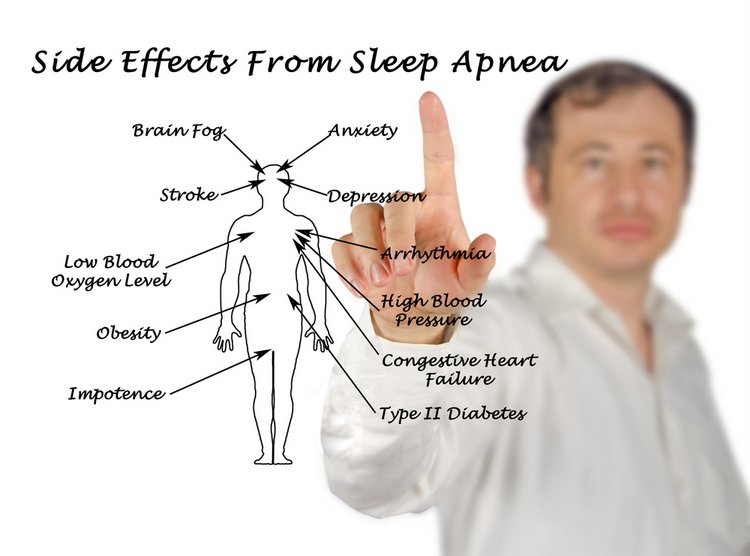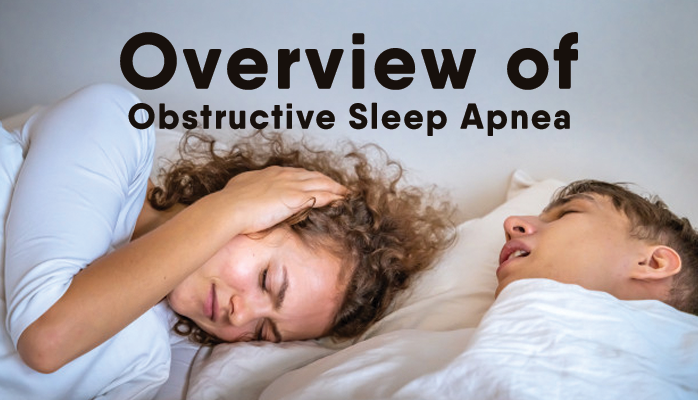What is Obstructive Sleep Apnea (OSA)
Obstructive sleep apnea is a potentially serious medical condition and sleeping disorder that can lead to severe sleep deprivation. OSA causes repeated cessations in breathing throughout the night, anywhere from 5-30 times per hour. This happens because the muscles in the back of the throat relax at night, blocking the airway. With each pause, the body must wake up to begin breathing again, however, the sleeper normally does not remember these events. Each blockage/arousal cycle is called an apnea or apnea event. Therefore, they awake each morning very tired but are unsure why.
What is Mild, Moderate, and Severe Obstructive Sleep Apnea?
There are three severity levels for OSA depending on the number of apneas per hour.
- Mild OSA: 5-14 apneas
- Moderate OSA: 15-30 apneas
- Severe OSA: 30+ apneas
Even mild sleep apnea will cause arousal from sleep, resulting in sleep deprivation. With severe apnea, one could wake at least 240 times per night, causing severe sleep deprivation.
What are Symptoms of Obstructive Sleep Apnea?
Some of the most common symptoms of obstructive sleep apnea are:
- Loud snoring
- Repeated stops in breathing throughout the night
- Restless sleep
- Morning headaches
- Daytime fogginess
- Severe daytime sleepiness
- Chronic irritability
One of the reasons OSA goes unnoticed for so long is because unless without a bed partner, most snorers are unaware of their nightly noises or pauses in breathing. Having a bed partner can make identifying a hallmark OSA symptoms much easier.
What are the Risks of Obstructive Sleep Apnea?

Risk of OSA are numerous and serious, and are caused because of chronic sleep deprivation. Some of the main risks are:
- High blood pressure
- Diabetes
- Stroke
- Heart disease
- Depression
- Reduced cognitive performance
- Reduced stress management
- Shorter life expectancy
- Lower quality of life
- Lower performance in many areas of life
How is OSA Treated?
For most cases of OSA, CPAP therapy will likely be the prescribed remedy. However, CPAP therapy may be prescribed only after other options are explored [resmed], including:
- Lifestyle changes (eating, drinking, tobacco use, and exercise habits)
- Losing weight
- Changing sleep position
- Medication changes
- Surgery (rare)
Why is this the case? Because mild sleep apnea may be caused by preventable causes, such as:
- Being overweight
- Excessive drinking, tobacco use, or poor eating habits
- Sleeping on your back
- Using certain medications
- Not exercising enough
- Anatomy
CPAP therapy is facilitated via a CPAP machine. A CPAP device/machine stands for Continuous Positive Airway Pressure and is the primary component of CPAP therapy and sleep apnea treatment. A CPAP machine is a small, rectangular box with a motorized fan inside and an adjacent humidifier.
Connected to the CPAP device is a flexible tube that leads to a breathing mask. The hose is lightweight and kept warm in order to reduce condensation. Among other things, too much condensation can lead to sanitation problems like mold growth. There are also many options for breathing masks to offer custom fit and different styles of mask.
Finally, the primary component in CPAP machines is a small fan inside. The small fan inside delivers gentle, positive pressure through a connected hose to the breathing mask. The result, no more lapses of breathing at night because the positive air pressure keeps your airway open. The pressure can be a little strange at first, but it’s rare that people report any long terms problems associated with it.
If you live in Alaska, and are concerned that you or a loved one has sleep apnea or has already been diagnosed, please consult with our sleep specialists about any questions you have by taking this free online sleep test below.


